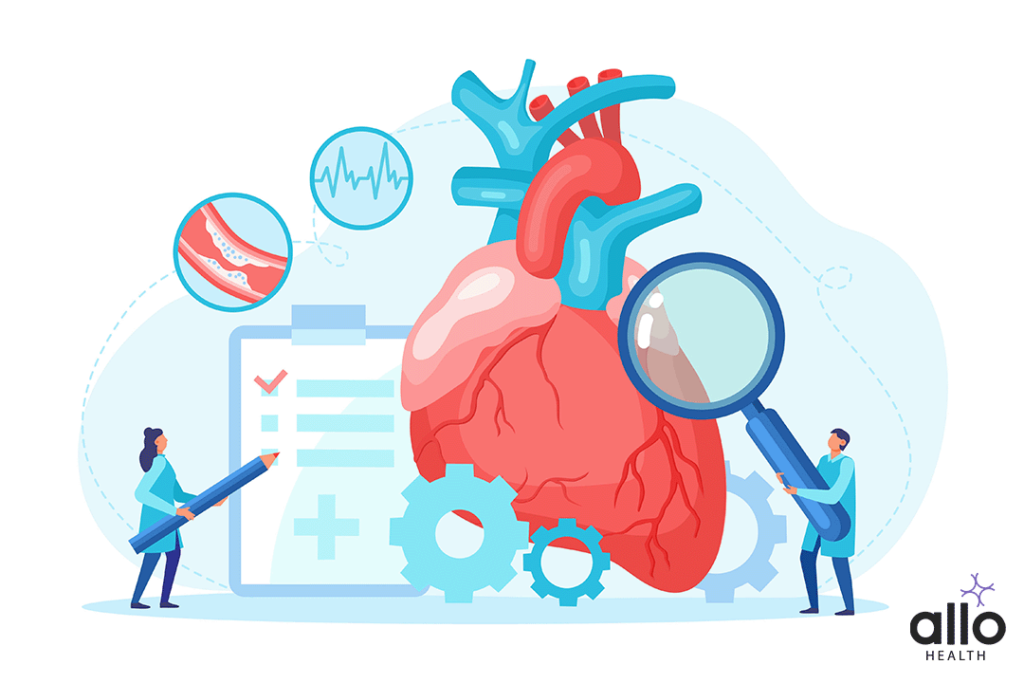What is the Most Common Cause of Erectile Dysfunction?

Allo Health is dedicated to personalized well-being, offering support and trusted information tailored to individual health goals. The platform emphasizes human-generated content, led by a distinguished medical team of experts, including physicians and sexual health specialists. Their commitment to credibility involves rigorous fact-checking, authoritative research, and continuous updates to ensure accurate, up-to-date information. Allo Health's unique approach goes beyond conventional platforms, providing expert-led insights and a continuous commitment to excellence, with user feedback playing a crucial role in shaping the platform's authoritative voice.

Ms Rachel graduated with a MSc. in clinical psychology from CMR university, Bangalore. With close to two years of experience in the field of Child and Adolescent Psychology.
Why This Was Upated?
Our experts continually monitor the health and wellness space, and we update our articles when new information became available.
Updated on 11 June, 2024
- Article was updated as part of our commitment to diversity, equity, and inclusion.

"The following blog article provides general information and insights on various topics. However, it is important to note that the information presented is not intended as professional advice in any specific field or area. The content of this blog is for general educational and informational purposes only.
Book consultation
The content should not be interpreted as endorsement, recommendation, or guarantee of any product, service, or information mentioned. Readers are solely responsible for the decisions and actions they take based on the information provided in this blog. It is essential to exercise individual judgment, critical thinking, and personal responsibility when applying or implementing any information or suggestions discussed in the blog."
Erectile dysfunction, a sexual dysfunction, (ED) affects millions of men worldwide, causing distress and impacting their quality of life. It’s essential to understand the most common causes and seek appropriate treatments to maintain a healthy sex life. In this comprehensive article, we’ll dive deep into the most common cause of erectile dysfunction in males, providing information on symptoms, diagnosis, and treatments. Keep reading to empower yourself with knowledge and take control of your sexual health.
What is Erectile Dysfunction (ED)?
Erectile dysfunction, also known as impotence, is the persistent inability to achieve or maintain an erection firm enough for sexual intercourse. It is a common condition affecting men of all ages, but its prevalence increases with age. ED can result from various factors, including physical, psychological, and lifestyle-related causes.
Statistics and Prevalence
ED is a widespread concern, with studies estimating that more than 50% of men aged 40 to 70 experience some form of erectile dysfunction. The prevalence of ED increases with age, but it is not an inevitable part of aging. Understanding the most common causes can help men of all ages address this concern proactively.
Most Common Cause of Erectile Dysfunction in Males
The most common cause of erectile dysfunction in males is vascular disease. Vascular disease refers to conditions that affect the blood vessels, including arteries and veins, disrupting the flow of blood throughout the body. This can lead to various health issues, including reduced blood supply to organs and tissues, potentially causing complications such as erectile dysfunction.
The Role of Blood Flow in Erections
- An erection is the result of increased blood flow to the penis, which causes it to become stiff and rigid.
- It occurs when the nerves in the penis are stimulated, and the blood vessels in the penis relax, allowing blood to flow into the spongy tissue called the corpora cavernosa.
- The increased blood circulation flow causes the penis to become engorged and stiff.
How Does Blood Flow Work in Erections?
- Healthy blood circulation and flow is a crucial component of erections.
- During sexual stimulation, the nerves in the penis release a chemical called nitric oxide, which stimulates the production of a second chemical called cyclic guanosine monophosphate (cGMP).
- cGMP causes the smooth muscle in the blood vessels of the penis to relax, allowing the blood vessels to dilate and allowing more blood to flow into the penis.
- The increased blood flow causes the corpora cavernosa to expand, compressing the veins that drain blood out of the penis.
- The compression of the veins traps the blood in the penis, causing it to become engorged and erect.
- Maintaining an erection requires the continuous production of cGMP.
- When the body stops producing cGMP, the smooth muscle in the blood vessels contracts, and the blood flow out of the penis increases, causing the penis to become flaccid.

What Factors Affect Blood Flow in Erections?
- Several factors can affect blood flow in erections, including age, health conditions, and lifestyle choices.
- As men age, the production of nitric oxide decreases, which can affect the ability to achieve and maintain an erection.
- Health conditions such as diabetes, high blood pressure, and heart disease can also affect blood flow and increase the risk of erectile dysfunction.
- Lifestyle choices such as smoking, excessive alcohol consumption, and a sedentary lifestyle can also affect blood flow and increase the risk of erectile dysfunction.
- Research has shown that quitting smoking, reducing alcohol consumption, and increasing physical activity can improve erectile function.
The Connection Between Vascular Health and Erectile Dysfunction
- The connection between vascular health and ED is well-established, with numerous studies linking the two conditions.
- Vascular diseases, such as atherosclerosis, can cause a decrease in blood flow to the penis, making it difficult to achieve or maintain an erection.
- Atherosclerosis is a condition where plaque builds up inside the arteries, causing them to narrow and harden. This condition can affect any artery in the body, including those that supply blood to the penis.
- Other conditions that can affect vascular health and contribute to ED include high blood pressure, diabetes, and obesity. These conditions can damage the blood vessels and lead to decreased blood flow to the penis, making it difficult to achieve or maintain an erection.
Fortunately, there are ways to improve vascular health and reduce the risk of ED. One of the most effective ways to improve vascular health is through lifestyle changes, such as regular exercise, maintaining a healthy weight, and quitting smoking. These changes can improve blood flow and reduce the risk of atherosclerosis, thereby improving erectile function.
In addition to lifestyle changes, medication can also help improve vascular health and treat ED. Medications such as Viagra and Cialis work by increasing blood flow to the penis, making it easier to achieve and maintain an erection. These medications are safe and effective for most men, but it’s essential to speak to a health professional before starting any new medication.
Direct Risk Factors for Vascular-Related ED
Vascular-related ED is a type of erectile dysfunction caused by a decrease in blood flow to the penis. This decrease in blood flow can be caused by a variety of factors, including atherosclerosis (narrowing of the arteries), high blood pressure, and diabetes.
- Age: As men age, they are more likely to develop vascular-related ED. This is because the aging process can cause damage to the blood vessels that supply the penis, leading to decreased blood flow.
- Smoking: Smoking is a significant risk factor for vascular-related ED. Smoking damages the blood vessels and can lead to atherosclerosis, which can cause narrowing of the arteries and decreased blood flow to the penis.
- Diabetes: Diabetes is a chronic disease that affects the body’s ability to regulate blood sugar levels. Over time, high blood sugar levels can damage the blood vessels and nerves that supply the penis, leading to vascular-related ED.
- High blood pressure: High blood pressure can cause damage to the blood vessels, leading to decreased blood flow to the penis. Additionally, the medications used to treat high blood pressure can also contribute to ED.
- Obesity: Obesity is a risk factor for vascular-related ED because it can lead to atherosclerosis and damage to the blood vessels. Additionally, obesity is often associated with other risk factors for ED, such as diabetes and high blood pressure.
- Sedentary lifestyle: A sedentary lifestyle is a risk factor for vascular-related ED because it can lead to obesity, high blood pressure, and other health concerns that can contribute to ED.
- Family history: If you have a family history of vascular-related concerns, such as high blood pressure, diabetes, or heart disease, you may be at an increased risk for vascular-related ED.
How to Reduce Your Risk for Vascular-Related ED
- Quit smoking: If you smoke, quitting is one of the best things you can do to reduce your risk of vascular-related ED.
- Maintain a healthy weight: Maintaining a healthy weight through diet and exercise can help reduce your risk for vascular-related ED.
- Control your blood pressure and blood sugar levels: If you have high blood pressure or diabetes, it’s important to work with your healthcare provider to control these conditions and reduce your risk for vascular-related ED.
- Stay active: Regular physical activity can help reduce your risk for vascular-related ED by improving blood flow and reducing your risk for obesity, high blood pressure, and other health concerns.
- Physical exam: Your doctor will check for physical signs of vascular problems, such as decreased pulses in the legs or an abnormal sound (bruit) over the blood vessels.
- Blood tests: These tests can check for high cholesterol, diabetes, and other conditions that increase the risk of atherosclerosis.
- Imaging tests: Ultrasound or angiography may be used to evaluate blood flow in the penile arteries.

Other Causes for Erectile Dysfunction
Psychological Factors
- Anxiety
- Depression
- Stress
- Relationship issues
- Performance anxiety
Neurological Disorders
- Multiple sclerosis
- Parkinson’s disease
- Stroke
Hormonal Imbalances
- Low testosterone levels
- Thyroid disorders
- Pituitary gland disorders
Medications
- Some antidepressants
- Antipsychotics
- Blood pressure medications
- Hormone treatments for prostate cancer
Pelvic Floor Dysfunction: Weak pelvic floor muscles or muscle imbalances
Diabetes: Poorly managed blood sugar levels can lead to nerve and blood vessel damage.
Obesity: Excess body weight can lead to hormonal imbalances and vascular issues.
Smoking: Smoking damages blood vessels and can contribute to erectile dysfunction.
Alcohol and Substance Abuse: Excessive consumption of alcohol or certain drugs can affect sexual function.
Surgery or Trauma:Pelvic surgery or injury to the pelvic area can lead to erectile dysfunction.
Prostate Conditions: Enlarged prostate (BPH) or prostate cancer and their treatments can impact erectile function.
Chronic Diseases: Conditions like kidney disease, liver disease, and chronic obstructive pulmonary disease (COPD) can contribute to erectile dysfunction.
Aging: Age-related changes in hormone levels and blood flow can play a role.
Sleep Disorders: Conditions like sleep apnea can disrupt hormone production and lead to erectile dysfunction.
Treatment of Erectile Dysfunction
Treatment for vascular-related ED typically focuses on addressing the underlying cause of atherosclerosis. Some common treatment options include:
- Lifestyle changes:Eating a healthy diet, exercising regularly (cardiovascular exercise), maintaining a healthy weight, quitting smoking, and managing stress can all improve vascular health and help reduce the risk of ED.
- Medications: The medical professional may prescribe medications to lower blood pressure, reduce cholesterol levels, or manage diabetes. These medications can help improve vascular health and reduce ED symptoms.
- Erectile dysfunction medications: Oral medications like sildenafil (Viagra), tadalafil (Cialis), and vardenafil (Levitra) can enhance blood flow to the penis, making it easier to achieve and maintain an erection. These medications are typically prescribed after addressing the underlying vascular concerns.
- Penile pumps:Vacuum erection devices use suction to draw blood into the penis, helping achieve an erection. These devices can be a helpful non-invasive medical treatment option for some men with vascular-related ED.
- Vascular Surgery:In some cases, surgical procedures to improve blood flow in the penile arteries may be recommended, such as angioplasty or bypass surgery.
Frequently Asked Questions (FAQs)
Q: What are the symptoms of erectile dysfunction?
A: A: Erectile dysfunction symptoms include difficulty achieving or maintaining an erection sufficient for sexual activity. Symptoms may also include reduced firmness, incomplete erections, or a complete inability to achieve an erection.
Q: Can vascular-related ED be reversed?
A: In many cases, addressing the underlying cause of atherosclerosis and making lifestyle changes can improve vascular health and reduce ED symptoms. However, the degree of improvement can vary, and it may not always be possible to completely reverse ED.
Q: Can I still use ED medications if I have vascular-related erectile dysfunction?
A: Yes, ED medications like sildenafil (Viagra), tadalafil (Cialis), and vardenafil (Levitra) can be helpful in managing ED symptoms even if the underlying cause is vascular-related. However, it’s essential to address the root cause of the problem to achieve the best results.
Q: How can I reduce my risk of developing vascular-related ED?
A: Adopting a healthy lifestyle can significantly reduce your risk of developing vascular-related ED. Some key steps include maintaining a healthy diet, exercising regularly, quitting smoking, managing stress, and seeking medical care for conditions like high blood pressure, high cholesterol, and diabetes.
Q: Can psychological factors contribute to ED, even if the primary cause is vascular-related?
A: Yes, psychological factors such as stress, anxiety, depression, and relationship concerns can worsen ED symptoms, even if the primary cause is vascular-related. Addressing both the physical and emotional aspects of ED is essential for successful treatment.
Q: When should I see a doctor about erectile dysfunction?
A: If you’re experiencing ongoing difficulties achieving or maintaining an erection, it’s essential to consult with a healthcare professional. ED can be a sign of an underlying health condition that requires attention. Early diagnosis and treatment can help improve your sexual health and overall well-being.







































